
Feature Story
UNDP Head Helen Clark highlights importance of gender equality for Papua New Guinea to achieve MDGs
22 February 2010
22 February 2010 22 February 2010A version of this story first appeared at undp.org
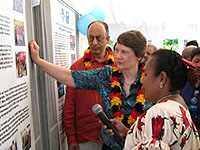
United Nations Development Programme Administrator Miss Helen Clark paid a three-day visit to Papua New Guinea to highlight significant opportunities which exist to promote investment in public service delivery, empower women, and advance the country's development agenda.
Credit: UNDP
United Nations Development Programme Administrator Miss Helen Clark highlighted HIV issues during her visit to Papua New Guinea (PNG). In her meetings with senior government and other officials, she underlined that “the United Nations development system stands ready to continue working with the Government and the people of Papua New Guinea in overcoming existing development challenges and accelerating progress towards the Millennium Development Goals, especially in areas such as education, health, advancing women’s empowerment and combating HIV/AIDS epidemic.”
At the UNDP Leadership Development Programme on HIV run by the Friends Foundation in the Gerehu suburb Miss Clark praised the programme for supporting people to back to their communities to find innovative ways to respond to the AIDS epidemic. Programmes include includes supporting orphans and reducing stigma and discrimination. She also met with one of three family sexual violence units at the Boroko police station in Port Mores which assists survivors of gender-based and domestic violence.
The sad truth is that where we see progress towards the MDGs lagging the most is often where the needs and status of women and girls are accorded low priority.
United Nations Development Programme Administrator Miss Helen Clark
Miss Clark launched the Second National MDG Progress Report together with the Minister for National Planning and District Development, Mr Paul Tiensten. As the report highlights, Papua New Guinea is currently off track to meet the Millennium Development Goals, including in areas of responding to HIV, reducing child and maternal mortality, and promoting gender equality.
“The sad truth is that where we see progress towards the MDGs lagging the most is often where the needs and status of women and girls are accorded low priority,” she said.
At the inauguration of the National Women’s Forum on Equality and Participation for Women: a Better Future for Papua New Guinea, which Miss Clark co-chaired with the Minister for Community Development, Dame Carol Kidu, the discussion focused on the need to increase women’s voices and participation in politics as a critical means to promote democracy, advance gender equality, and achieve sustainable and inclusive development.
Women in decision-making has been a critical issue in Papua New Guinea against a backdrop of a high level of gender-based violence coupled with high rates of HIV among women and girls between the ages of 15-29 years. Papua New Guinea currently has only one female Member of Parliament, and efforts are underway to reserve 22 seats for women in Parliament.
“Efforts to promote gender equality, including promoting girls’ education, improving maternal health, combating gender-based violence, and securing female representation in government leadership positions, are of critical importance to advance development in Papua New Guinea,” said Miss Clark. “Unleashing the potential of Papua New Guinea means giving women the same opportunities in life as men,” she said.
UNDP Head Helen Clark highlights importance of ge
Cosponsors:

Feature Story
UNDP engages Namibian communities in conversation on sexuality and HIV
01 February 2010
01 February 2010 01 February 2010A version of this story was first published at www.undp.org
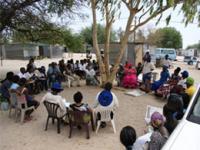
Community conversations have proven to be an effective way to combat HIV in Namibia.
Credit: UNDP Namibia
What causes people to have more than one sexual partner at a time? “Sexual desire and satisfaction”; “It’s a cultural and social norm”; “Poverty and hunger; it’s a way to survive.” These are just some of the perspectives that emerged when communities under four traditional authorities came together to talk about what is known as ‘multiple and concurrent partnerships’ in the Caprivi region, in North East Namibia. This region is the most affected by the HIV epidemic in the country, where one in three pregnant women were found to be living with HIV in 2008.
The community conversations held late in 2009 is one of many taking place in throughout the country as part of a nationwide programme that engages communities in dialogue on the causes of HIV, boosting local responses to the epidemic.
Long ago, marriages were respected. Nowadays, we have left this culture behind and both men and women have multiple sexual partners.
Participant in the UNDP project “Community Capacity Enhancement through Community Conversations.” December, 2009.
The programme is known as ‘Community Capacity Enhancement through Community Conversations’. It is being implemented by the Namibian Ministry of Regional and Local Government, Housing and Rural development, with the support of the United Nations Development Programme (UNDP) in Namibia.
Multiple and concurrent partnerships have been identified as one of the main reasons why HIV has spread so rapidly in Namibia. “Long ago, marriages were respected. Nowadays, we have left this culture behind and both men and women have multiple sexual partners”, said one participant.
“By bringing together men, women and all those affected by HIV, this approach gives people the opportunity to make their voices heard, to identify their needs and to be counted when decisions about AIDS interventions are made,” says the Manager of UNDP’s Community Capacity Enhancement Programme, Immanuel Mwilima.
Community Capacity Enhancement through Community Conversations is a tried and tested methodology to boost the capacity of communities to identify concerns, deliberate on solutions and map out courses of action around AIDS.
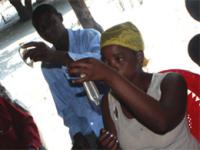
Community members working with condoms during a community conversation on MCP in Katima Mulilo, Caprivi region.
Credit: UNDP Namibia
The approach opens up spaces for discussions based on relationships of trust and mutual respect.
According to Mr Henk Van Renterghem, UNAIDS Country Coordinator in Namibia, the community conversations offer a unique opportunity to strengthen the capacity of communities to engage with local government and development partners on the allocation of resources in the AIDS response.
“Too often communities are considered to be the passive recipients or beneficiaries interventions. They are inadequately consulted in top down processes for the identification of needs and priorities,” said Mr van Renterghem.
Too often communities are considered to be the passive recipients or beneficiaries interventions. They are inadequately consulted in top down processes for the identification of needs and priorities.
Mr Henk Van Renterghem, UNAIDS Country Coordinator in Namibia
To date, communities in nine regions are conducting community conversations, with impressive results. In Caprivi, traditional leaders have led by example, going for voluntary counselling and testing and tackling the stigma associated with testing. In the words of one leader: “It is shocking that many of our relatives and loved ones have died because of AIDS....If this programme had come sooner, our relatives would have been alive today.”
Many challenges still remain in the AIDS response, however. For instance, 17.8% of pregnant women are HIV-positive in Namibia. “One of the biggest challenges facing rural communities in relation to accessing treatment, care and support services is stigma, discrimination, cultural norms and practices. Community Capacity Enhancement gives communities an opportunity to have an introspection of their cultural practices, norms and values,” says Lebogang Motlana, the Deputy Resident Representative of UNDP in Namibia. While the country is among the five most affected by HIV around the world, the epidemic is now on a downward trend, at just over 15%, after peaking at 22% in 2002.
UNDP engages Namibian communities in conversation
Cosponsors:
United Nations Development Programme (UNDP)
Feature stories:
Dispatch from the field: WHO HIV Director tours pioneering treatment clinic in Namibia (01 July 2009)
Ambitious project brings key countries in eastern and southern Africa closer to ‘knowing their epidemics’. (25 May 2009)
Consultation held on definition and measurement of concurrent sexual partnerships (24 April 2009)
Talking about OneLove in Southern Africa (06 February 2009)

Feature Story
Peru: New campaign to counter stigma and discrimination towards people living with HIV
11 December 2009
11 December 2009 11 December 2009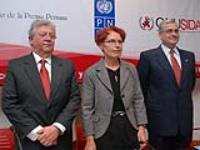 Luis Agois President of the Peruvian Press Council, Renate Ehmer, UNAIDS Coordinator for Peru, Ecuador and Bolivia and Jorge Chediek, Resident Representative of the UN system at the launch of the new campaign.
Luis Agois President of the Peruvian Press Council, Renate Ehmer, UNAIDS Coordinator for Peru, Ecuador and Bolivia and Jorge Chediek, Resident Representative of the UN system at the launch of the new campaign. Credit: UNAIDS/UNDP/CPP
In Peru, 76 000 people are living with HIV. While HIV prevalence in the general population is relatively low at 0.5%, the men who have sex with men and the transgender communities have been hard hit by the epidemic with an estimated prevalence of 10.8% and 32% respectively.
A range of complex social prejudices result in people living with the HIV being frequently subject to discrimination in the workplace and in wider society.
To counter stigma towards people living with HIV in Peru a new campaign was launched in November 2009; a joint initiative by UNAIDS, UNDP and the Peruvian Press Council.
The purpose of the multimedia campaign, entitled “An image against stigma and discrimination caused by HIV and AIDS”, is to create a supportive environment for people living with HIV, free of discrimination and fear.
Estimates by civil society organizations reveal that an increasing number of hate crimes are taking place every year, most of which go unpunished.
Renate Ehmer, UNAIDS Coordinator for Peru, Ecuador and Bolivia
Speaking at the launch, the President of the Peruvian Press Council Luis Agois noted the role media can play. “Our contribution is the broadcasting of this campaign, an initiative which has been enthusiastically joined by the press in general in Peru.”
Fear of social repercussions and the discrimination that might result from a positive HIV test, many Peruvians avoid leaning their HIV status according to Jorge Chediek, Resident Representative of the UN system, further jeopardizing their health. “As a consequence, they can’t access treatment; and HIV treatment in Peru is free.”
Renate Ehmer, UNAIDS Coordinator for Peru, Ecuador and Bolivia highlighted the extreme expressions of stigma and discriminations that result in violence, “hate crimes; when men and women are killed because of their sexual orientation or gender identity.”
“Estimates by civil society organizations reveal that an increasing number of hate crimes are taking place every year, most of which go unpunished,” Ms Ehmer continued.
The campaign brings together Peruvian celebrities and people living with HIV who appear on posters and brochures and distributed nation-wide.
The high profile participants include Javier Velasquez Quesquen, Head of the Cabinet of Ministers; Javier Villa Stein, President of the Judiciary; Oscar Ugarte, Minister of Health; Jose Antonio Garcia Belaunde, Minister of Foreign Affairs; Antonio Brack, Minister of Environment; Monsignor Bambaren, Nolberto Solano, football players, members of the music group Grupo 5 and comedian Carlos Alvarez as well as Economist Hernando de Soto.
Two short films have also been produced as part of the campaign and can be watched here:
An image against stigma and discrimination caused by HIV and AIDS vol 1
An image against stigma and discrimination caused by HIV and AIDS vol 2
Peru: New campaign to counter stigma and discrimi
Cosponsors:
Multimedia:
An image against stigma and discrimination caused by HIV and AIDS vol 1
An image against stigma and discrimination caused by HIV and AIDS vol 2
Feature stories:
Developing indicators on HIV-related stigma and discrimination (30 November 2009)
United Kingdom rollout The People Living with HIV Stigma Index (30 November 2009)
Publications:
Reducing HIV Stigma and Discrimination: a critical part of national AIDS programmes (pdf, 598 Kb)
HIV-related Stigma, Discrimination and Human Rights Violations. Case Studies of successful programmes (pdf, 1 Mb)

Feature Story
World AIDS Day to be marked by UNAIDS Office in Washington
30 November 2009
30 November 2009 30 November 2009In collaboration with twenty-six civil society organizations, the United Nations Development Programme (UNDP), the United Nations Office on Drugs and Crime (UNODC), the United Nations Population Fund (UNFPA), and the World Bank, UNAIDS is hosting a luncheon on 1 December which completes a policy forum series on HIV, human rights and key at-risk populations.
In recent months UNAIDS has hosted leaders from around the world in Washington, DC to discuss the human rights issues of addressing HIV in three key at-risk populations: men who have sex with men on 16 September; sex workers on 15 October; and people who inject drugs on 12 November. A representative from each population will address human rights and universal access. Civil society representatives will present recommendations to the United States government. U.S. Representative Jim McDermott (Washington State) will give special remarks.
Related
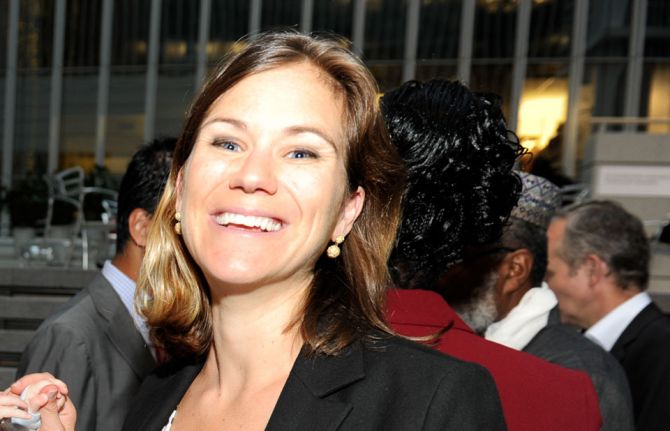 A tribute to Maeve Kennedy Townsend McKean
A tribute to Maeve Kennedy Townsend McKean

09 April 2020
 UNAIDS is awarded the Science and Medicine Award at the 25th Annual Steve Chase Awards
UNAIDS is awarded the Science and Medicine Award at the 25th Annual Steve Chase Awards

12 February 2019
 AIDS care in the Californian desert
AIDS care in the Californian desert
12 February 2019

Feature Story
UNDP: Bangladeshi women migrants abroad vulnerable to HIV
27 November 2009
27 November 2009 27 November 2009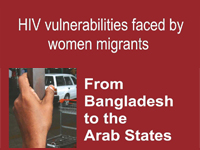
Credit: UNDP
Many Bangladeshi women migrant workers in the Arab states are subject to mandatory HIV testing and are deported if found to be living with the virus. They also often face physical and sexual abuse at the hands of their employers. These are the stark findings of a report released this week by the UN Development Programme (UNDP) and the country’s Ovibashi Karmi Unnayan Programme (OKUP).
HIV vulnerabilities faced by women migrants: from Bangladesh to the Arab States, explores the often profound health, social and economic problems experienced by many women who choose to leave their home country in search of employment, often as domestic workers.
Although migration itself is not a risk factor for HIV infection, the conditions under which some workers migrate and their living conditions in the host countries make them highly vulnerable to HIV.
Dr. Salil Panakadan, UNAIDS Country Coordinator
Migrant workers in general provide key support to Bangladesh’s economy. According to Stefan Priesner, UNDP Country Director, “The economic gains generated by migrant workers are enormous, reaching almost 9.4 % of GDP in Bangladesh in 2007.” He added, “It is, therefore, critical that good working conditions and support are provided to migrant workers throughout the migration cycle.”
The report is based on nearly 250 interviews with women migrants who shared their experiences of numerous hardships including long working hours, irregular payment of wages and physical and sexual abuse. This can lead to even greater vulnerability as women sometimes run away and find themselves open to other forms of exploitation, such as forced sex work and trafficking, clearly making them more at risk of HIV infection. Often, when they are found to be positive after involuntary testing, they are sent home.
“Although migration itself is not a risk factor for HIV infection, the conditions under which some workers migrate and their living conditions in the host countries make them highly vulnerable to HIV,” says Dr. Salil Panakadan, UNAIDS Country Coordinator. “In many cases, HIV testing in both countries of origin and host countries breaches migrants’ rights – testing is undertaken without consent, counseling, confidentiality or support.”
Shakirul Islam Lead Researcher and Chairman of OKUP also contends that vulnerability to HIV among female migrant workers is a key concern. “When analysing the unsafe conditions that Bangladeshi women face when migrating to work overseas, we found that the absence of laws and regulations in the recruitment process for migrant domestic workers and the poor working conditions they face once on site render women very vulnerable, altogether contributing to a higher risk of contracting HIV.”
He also maintains that more could be done to counter this state of affairs. “Inadequate pre-departure orientation on HIV and health vulnerabilities for departing migrants is also a big gap. Most importantly, although migrants are included in the country’s national strategic plan for AIDS, there is no national HIV response for migrant workers.”
If women migrant workers are found to be living with the virus and sent home as a result, it is argued that more needs to be done to help ensure their wellbeing. “The regional report highlights that the deportation of HIV-positive migrants by host countries and the absence of reintegration programmes in countries of origin can be devastating for the health, well-being, and livelihoods of migrants and their families,” says Caitlin Wiesen, UNDP HIV Team Leader and Regional Programme Coordinator “There is an urgent need to set up effective reintegration programmes for returning migrants and ensure their access to health services and livelihood options.”
The Arab States are the primary destination for many migrant workers from Asia, including Bangladesh. The host countries examined in the study are: Bahrain, Lebanon and UAE.
The study reveals that there is no minimum wage for Bangladeshi domestic workers either in Bahrain or in Dubai and that domestic workers in both countries are paid only around $100 a month. Such work is not covered by labour laws in either the Arab states in question or in Bangladesh itself so women migrants have no access to legal redress when abused.
“Many migrant workers….are subject to exploitation and mistreatment, and that is a worldwide problem that we are very concerned about.” says Engr. Khandaker Mosharraf Hossain, Honourable Minister for Labour, Employment, Expatriate Welfare and Overseas Employment. “Host countries and countries of origin have an equal responsibility to provide protective policies and programmes. However, progress is being made and there is more dialogue between origin and host countries which is helping us ensure that migrants’ rights are respected and protected while they are abroad.”
The Bangladesh study, forms one of the country chapters of the regional report titled: HIV vulnerabilities faced by women migrants: from Asia to the Arab states launched in March this year.
UNDP: Bangladeshi women migrants abroad vulnerabl
Cosponsors:
Feature stories:
China’s vocational schools play a key role in AIDS education (16 October 2009)
Migrant workers and HIV vulnerability in South Asian and South East Asian countries (18 May 2009)
'Never abandon, never give up’: ILO film helps China’s migrant workers challenge AIDS stigma (30 April 2009)
New report shows Asian migrant women in the Arab states have heightened vulnerability to HIV (10 March 2009)
Publications:
HIV vulnerabilities faced by women migrants: from Bangladesh to the Arab States
HIV Vulnerabilities of Migrant Women: from Asia to the Arab States
Migrants and HIV: “Far Away from Home” club
Policy Brief - HIV and International Labour Migration

Feature Story
More needs to be done to help young people most at risk of HIV infection
10 August 2009
10 August 2009 10 August 2009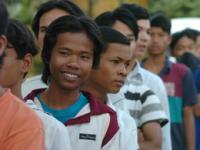
Credit: UNAIDS/O.O'Hanlon
In general, HIV prevention services in the Asia region are currently not reaching young people who are most at risk of infection, which include those who inject drugs, who engage in unprotected male to male sex and those involved in sex work and their clients. In order to address this situation the Asia Pacific Regional UN Coordination Group on Most at Risk Young People hosted a symposium at the IX International Congress on AIDS in Asia and the Pacific.
According to epidemic models presented in the 2008 AIDS in Asia Commission report, over 95% of all new HIV infections in the Asia region occur among such most at risk young populations. However, over 90% of resources for young people as a group are spent on low-risk youth, who represent less than 5% of infections.
Entitled "HIV prevention and most at risk young people", the event was sponsored jointly by UNFPA, UNICEF, UNESCO, UNAIDS, UNDP, WHO and is supported by 7Sisters, the Coalition of Asia Pacific Regional Networks on HIV/AIDS. It examined, among other issues, how the specific needs of most at risk young people should be addressed, what works and what doesn't and how partnerships between youth, NGOs and government can be strengthened.
The symposium discussed the nexus of unsafe sexual behaviours among most at risk young people where a number of such practices coexist in the same environment. Sex work, drug use and unprotected sex with multiple partners can all occur in the same social network. Therefore, participants looked at an approach which addresses a multiplicity of needs, meshing and coordinating previously implemented programmes and ensuring a youth-friendly approach.
A comprehensive, evidence-informed response, it was argued, requires firm commitment from donors and governments to address the specific needs of most at risk young people, and an examination of the contexts in which these risks occur. The engagement of this group in developing the policies, programmes and processes that directly affect and benefit them is seen as a prerequisite. Young people played an active and central role in this event as the practical aspect of exactly how to get youth involved in decision making was explored.
Specific objectives of the meeting also included promoting awareness among policy makers and programme planners on the urgent need for HIV prevention for most at risk young people and encouraging increased collection, analysis and use of data on this key group to support advocacy efforts and inform budget allocation priorities. Sharing experience of programming in this area, both positive and not so positive, was on the agenda too.
Among those taking part in the event were the UNFPA's Deputy Executive Director (Programme), Purnima Mane. UNESCO’s Jan de Lind van Wijngaarden, and UNICEF’s Margaret Sheehan spoke on behalf of the Asia Pacific Regional UN Coordination Group on Most at Risk Young People. James Chau, member of the AIDS2031 initiative, UNAIDS Goodwill Ambassador and Chinese television presenter facilitated the panel discussion. The panel also involved representatives of the medical profession, NGOs, health ministries and representatives of young people involved in sex work, drug use and male to male sex.
More needs to be done to help young people most a
IX International Congress on AIDS in Asia and the Pacific
Cosponsors:
Partners:
7Sisters, the Coalition of Asia Pacific Regional Networks on HIV/AIDS
Feature stories:
International Harm Reduction conference opens in Bangkok (20 April 2009)
OPINION: HIV and drugs: two epidemics - one combined strategy (20 April 2009)
Swing and Sisters: HIV outreach to sex workers in Thailand (19 March 2009)
Injecting drug use and HIV: Interview with UNAIDS Team Leader, Prevention, Care and Support team (11 march 2009)
OPINION: Silence on harm reduction not an option (11 March 2009)
Spotlight: men who have sex with men and HIV (16 February 2009)
Hidden HIV epidemic amongst MSM in Eastern Europe and Central Asia (26 January 2009)
HIV prevention hampered by homophobia (13 January 2009)
Publications:
UNAIDS Action Framework: Universal Access for Men who have Sex with Men and Transgender People (pdf, 323 Kb.)
Framework for monitoring and evaluating prevention programmes for most-at-risk-populations (pdf, 1.49 Mb.)
Policy Brief: HIV and Sex between men (pdf, 277 Kb.)

Feature Story
UNAIDS Cosponsors out in force for 9th ICAAP
09 August 2009
09 August 2009 09 August 2009
The 10 UNAIDS Cosponsors are presenting a strong showing as thousands of delegates converge in Bali, Indonesia, to share ideas, knowledge, best practices, lessons learned and research findings at the 9th International Congress on AIDS in Asia and the Pacific (ICAAP).
The Cosponsors are an integral part of the UN’s response to the global AIDS epidemic and UNAIDS brings together their efforts and resources.
Echoing the Congress theme, ‘Empowering people - strengthening networks’, the Cosponsors are organising and presenting symposia, skills-building workshops and satellite meetings drawing together a number of participants from a range of disciplines with the aim of helping to build and nurture partnerships to bolster the AIDS response in the region.
A number of events are joint Cosponsor initiatives. For example, the Symposium on ‘HIV prevention and most at risk young people’, taking place on 10 August, is sponsored by UNFPA, UNICEF, UNESCO, UNDP, WHO and UNAIDS. The symposium, hosted by the Asia Pacific Regional UN Coordination Group on Most at Risk Young People, is designed to look at the specific needs of this population which is, in general, not being reached by HIV prevention services. This includes injecting drug users, men who have sex with men and sex workers and their clients. Representatives from these groups will also take part in the panel discussion –one further example of how Cosponsor ICAAP activities are designed to involve key populations.
Other examples of Cosponsor activities include UNDP, ILO and UNAIDS (with the Joint United Nations Initiative on Mobility and HIV/AIDS in South East Asia) collaborating on a joint symposium on 12 August entitled, ‘The Impact of the Financial Crisis on Labour Migration and HIV’ in which they will bring their respective expertise to bear on this pressing international issue. UNHCR, along with UNAIDS, is hosting a satellite session on 12 August called ‘Opportunities and challenges in addressing HIV amongst diverse humanitarian populations’. WFP will use a satellite session on 11 August to explore the vital role of nutrition and food security for people living with HIV and will, along with its partners, look at ‘Models for integrating nutrition and food security into HIV care, support and treatment in the Asia Region: Opportunities and challenges’.
The World Bank is also championing the screening, on 10 August, of the film, Suee (Needle) by Cannes Film Festival award winner, Sai Paranjpye, which deals with the lives of injecting drug users and the anti-AIDS stigma they face. The film emerged from the South Asia Region Development Marketplace, a grant programme spearheaded by the Bank and supported by a range of partners including UNAIDS, UNICEF, UNODC and UNDP.
There is an extremely broad range of other Cosponsor activities taking place over the five days of the Congress and a number of these events will be highlighted on the UNAIDS website as the ICAAP progresses.
UNAIDS and its ten Cosponsors work to provide technical support to countries to assist them in the implementation of their national AIDS plans. A ‘division of labour’ guides the technical support provided to enhance coordination, avoid duplication and provide the best assistance available. Each of the Cosponsor organizations leads in at least one technical area. These organizations are:
Office of the United Nations High Commissioner for Refugees (UNHCR)
United Nations Children's Fund (UNICEF)
United Nations Development Programme (UNDP)
United Nations Population Fund (UNFPA)
United Nations Office on Drugs and Crime (UNODC)
International Labour Organization (ILO)
United Nations Educational, Scientific and Cultural Organization (UNESCO)

Feature Story
US First Lady Michelle Obama visits UNDP projects in Moscow
08 July 2009
08 July 2009 08 July 2009 Michelle Obama visited the St. Dimitry Sisterhood Medical Nurses College in Moscow.
Michelle Obama visited the St. Dimitry Sisterhood Medical Nurses College in Moscow.Credit: UNDP/Andrei Radkevich
US First Lady Michelle Obama visited St. Dimitry Sisterhood Medical Nurses College in Moscow, a nursing school that cares for people living with HIV on 7 July. While there, she stressed the need for more information and education to reduce stigma and raise awareness about how to care for people living with HIV. Ms. Obama, who worked previously as an executive for University of Chicago Hospitals, also shared her experience in the health care field and noted the importance of the work.
Created in 1992, the college trains nurses to care for people living with HIV as part of a larger UNDP project funded by USAID. St. Dimitry Sisterhood and Medical Nurses College aims to contribute to the decrease in HIV and AIDS incidence in the Russian Federation and mitigate the impact of the epidemic on the population by involving the Russian Orthodox Church in the prevention of the spread of the epidemic, reduction of stigma and discrimination, and provision of care and support to people living with HIV and affected by AIDS.
Sister Olga, project coordinator, emphasized that many more people, including youth and children, need this kind of support. “Our sisters are helping families with HIV-positive members as well as HIV-positive children living in orphanages,” she said.
UNDP works to prevent the spread of HIV and reduce the impact of AIDS. As a trusted development partner, and cosponsor of UNAIDS, it helps countries put HIV at the centre of national development and poverty reduction strategies; build national capacity to mobilize all levels of government and civil society for a coordinated and effective response to the epidemic; and protect the rights of people living with HIV, women, and vulnerable populations. Because HIV is a worldwide issue, UNDP supports these national efforts by offering knowledge, resources and best practices from around the world.
For more information, visit hivrussia.ru (in Russian) and the UNDP Russia Web site.
US First Lady Michelle Obama visits UNDP projects
Cosponsors:
Partners:
Feature stories:
Consultation on HIV prevention in the Russian Federation (10 march 2009)
Hidden HIV epidemic amongst MSM in Eastern Europe and Central Asia (26 January 2009)
“Artists Against AIDS” help fight stigma and discrimination in Russia (17 November 2008)
Related

Feature Story
Michel Sidibé meets with UNDP Administrator
04 June 2009
04 June 2009 04 June 2009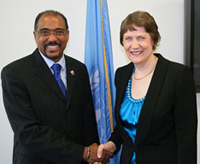
UNAIDS Executive Director Michel Sidibé met UNDP Administrator Helen Clark, 3 June 2009.
Credit: UNDP
UNAIDS Executive Director Michel Sidibé met with UNDP Administrator Helen Clark at UNDP headquarters in New York on 3 June 2009. The United Nations Development Programme (UNDP) is a Cosponsor of the Joint United Nations Programme on HIV/AIDS (UNAIDS).
Mr Sidibé and Ms Clark discussed maximising UNDP’s comparative advantage at the country level in support of national efforts to achieve universal access to HIV prevention, treatment, care and support as described in the UNAIDS Outcome Framework (2009-2011). The Framework calls for optimizing partnerships between the Secretariat and Cosponsors and leveraging respective organizational mandates and resources to work collectively to deliver results.
UNDP's response to AIDS stems from its human development, poverty reduction and governance mandates. Substantial progress on a number of Millennium Development Goals—including poverty, gender, education, and child and maternal mortality—can be achieved by integrating the AIDS response with efforts to achieve broader human development and the goals of health and social justice.
UNDP helps countries put HIV at the centre of national development and poverty reduction strategies. It also assists countries build national capacity to mobilize all levels of government and civil society for a coordinated and effective response to the epidemic; to protect the rights of people living with HIV as well as women and vulnerable populations.
Michel Sidibé meets with UNDP Administrator
Cosponsors:
Multimedia:
View photo gallery 3 June 2009
Publications:
Joint action for results: UNAIDS Outcome Framework (2009-2011) (pdf, 432 Kb.)
Related
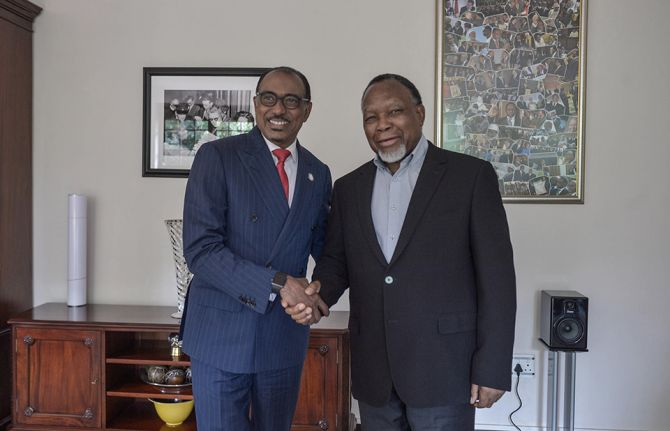 Keeping up the momentum in the global AIDS response
Keeping up the momentum in the global AIDS response

24 April 2019
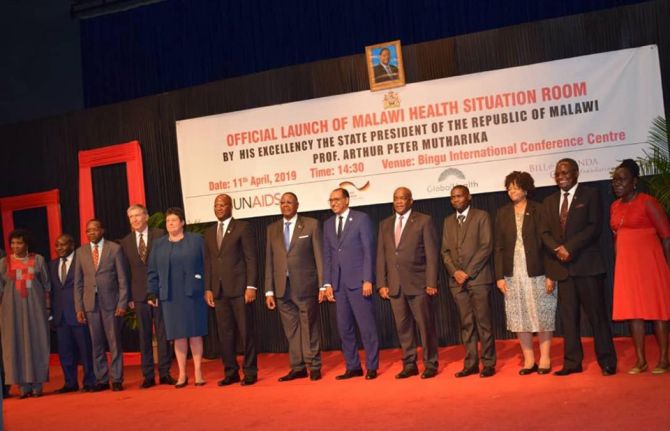 Malawi launches its health situation room
Malawi launches its health situation room

12 April 2019
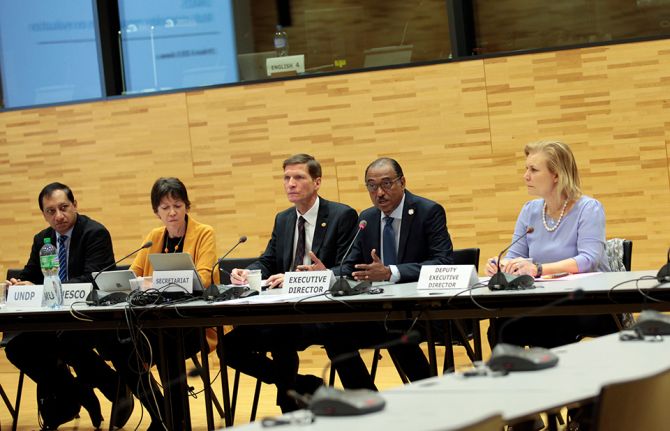 Learning lessons on evaluation
Learning lessons on evaluation

02 April 2019

Feature Story
African Parliamentarians commit to universal access to HIV services
18 May 2009
18 May 2009 18 May 2009 UNAIDS and UNDP in West and Central Africa signed a memorandum of understanding with the Forum of Arab and African Parliamentarians for Population and Development (FAAPPD)
UNAIDS and UNDP in West and Central Africa signed a memorandum of understanding with the Forum of Arab and African Parliamentarians for Population and Development (FAAPPD) Credit UNAIDS/M.O. Dème
UNAIDS and UNDP in West and Central Africa have signed a memorandum of understanding with the Forum of Arab and African Parliamentarians for Population and Development (FAAPPD) formalizing the commitment of the Parliamentarians to work towards the goal of universal access to HIV prevention, treatment, care and support services in the region.
Established in 1997, FAAPPD is an organization of parliamentarians constituted of the national networks of parliamentarians working on health issues, including HIV, in 61 African and Middle Eastern Countries.
The role of parliamentarians in creating and strengthening societal dialogue on key issues such as access to HIV-related prevention, treatment and care services for the most marginalized and vulnerable is needed now more than ever.
Dr Meskerem Grunitzky-Bekele, UNAIDS Regional Director for West and Central Africa and Mr Jean-Christophe Deberre, Deputy Regional Director, UNDP West and Central Africa
The memorandum of understanding describes joint activities involving the regional partners in order to strengthen the role of the parliamentarians in a range of issues including leadership, law reform and ensuring the sustainability of the response to HIV through budgetary allocation.
Welcoming this important milestone of leadership for universal access, Dr Meskerem Grunitzky-Bekele, UNAIDS Regional Director for West and Central Africa and Mr Jean-Christophe Deberre, Deputy Regional Director, UNDP West and Central Africa noted that: “the role of parliamentarians in creating and strengthening societal dialogue on key issues such as access to HIV-related prevention, treatment and care services for the most marginalized and vulnerable is needed now more than ever.”
The signing of the memorandum of understanding is part of regional collaboration between partners UNAIDS, UNDP, UNICEF, UNODC, OHCHR, UNIFEM, UNFPA, ECOWAS, OSIWA, USAID and FAAPPD. By working together the partners hope to create an enabling environment for an effective AIDS response in West and Central Africa.














